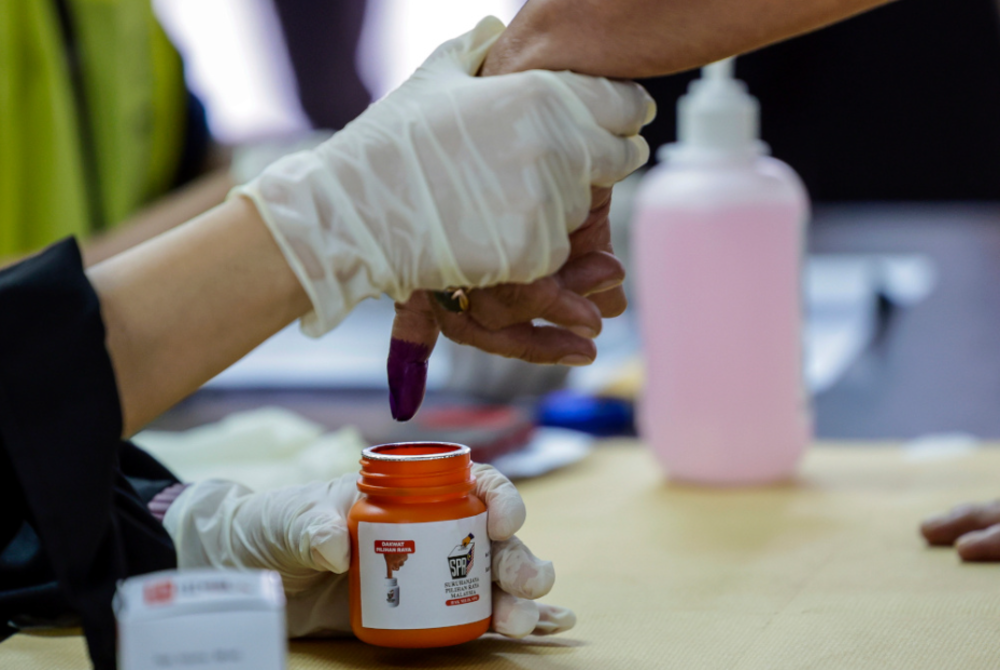GE15: Don’t fritter away democratic right as every vote counts
18 Nov 2022 08:40am

Image for illustrative purposes only - FILE PIX
Six general elections have taken place in this country since this private sector employee turned 21 in 1995, the year the ninth general election was held.
Her excuse for not registering herself as a voter? It was, according to her, the "troublesome” voter registration process.
"My parents used to bug me to get myself registered as a voter but I refused because (I thought) it was troublesome.
"Moreover, I didn’t feel it (voting) was an obligation and failed to see its importance. I used to think what difference can my one vote make,” said the mother-of-three.
However, the political uncertainty that prevailed over the last four years compelled her to have a change of heart and she is raring to exercise her democratic right at the 15th general election (GE15) tomorrow.
Suriati regrets not having voted before, saying that only now she realises the value of every single ballot paper in determining the outcome of an election and bringing about political stability.
She added that the current automatic registration process for all voters aged 18 and above has made it more convenient for people like her to vote.
"The time has come for me to help choose the leaders of our nation... previously, I just left it to others and accepted (whoever was elected to run the government) but not anymore,” said Suriati, who will be casting her vote in the Bangi Parliamentary constituency which is among the hot seats in GE15 and facing an eight-cornered fight.
With over 300,000 eligible voters in Bangi, this constituency has the highest number of voters in the nation.
Constitutional amendments to allow automatic voter registration and lower the voting age to 18 from 21 were enforced in Malaysia last December.
These changes resulted in Malaysia’s electorate doubling to 21.17 million - five million of them being first-time voters - compared to GE14’s electorate of 11 million.
Although observers have said the political instability that rocked the previous Parliamentary term will drive voters to the polling centres tomorrow, political analyst Dr G. Manimaran, however, opined that the same issue may impel some people to sit out this election.
According to him, some groups of voters, including first-timers, don’t know who they should vote for or are fence-sitters that were frustrated with the goings-on in the nation’s political arena in the past four years or so.
"People are tired of what they saw in the last four years. The people had voted (in GE14), yet the government changed a few times. There seemed no end to the political crisis... it brought no benefit to the voters or gave them any hope,” he told Bernama.
Even so, said Manimaran, the lessons learned from the last four years would have made voters more mature in terms of choosing the best candidates to steer the nation in the right direction for the next five years.
"Don’t be frustrated, we must go out and vote. Treat your frustration as a lesson and as part of a more mature democratic process. The people must be proactive in choosing their government,” he said.
Every vote, he stressed, will count, more so in this general election which is witnessing stiff competition what with many coalitions, parties and independent candidates joining the fray.
"About RM1.01 billion is being spent on this general election. When divided among the 21 million eligible voters, it will work out to about RM48 per person. So, don’t let this RM48 go to waste.
"Don’t spoil your vote as it will only harm the democratic process. Choose the party that can govern this nation well. Wasting our vote is akin to wasting food,” he added.
Manimaran also did not rule out the possibility that many fence-sitters may decide to give this election a miss. According to him, clear-cut manifestos as well as the approach used by parties to win over the people can attract at least 40 percent of voters.
Security and political analyst at Universiti Teknologi MARA’s Centre for Media and Information Warfare Studies Dr Noor Nirwandy Mat Noordin, meanwhile, said voters who are still sitting on the fence can be classified into three groups.
The first group consists of voters with voting experience but are now passive and refraining from voting. The second group will go out to vote and their choice will be based on the manifestos and performance of the coalitions that governed the nation in the last four years.
"The third group is made up of those who want to see a certain dominant party ruling the nation. For example, those who want the leadership to be dominated by an Islamic political party will choose the party that can make it happen,” he explained.
Noor Nirwandy also said some fence-sitters may be inclined to choose a candidate based on his/her coalition’s "poster boy” or prime minister candidate.
"Young voters may go for new faces who also happen to be popular,” he added. - BERNAMA












